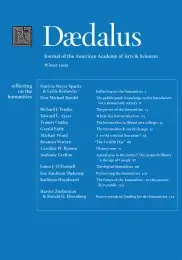The humanities & social change
The mere exercise of reading the text as it really is will make the reader moral and wise in a direct way that no systemic body of dogmatic teaching can rival. . . . The real point of close reading is that it produces the right sort of person–a person of evident worth.
–Anthony Grafton and Lisa Jardine, From Humanism to the Humanities1
The humanities today seem caught in an irresolvable contradiction. At any given moment, they see themselves either as cultural gatecrashers and agents of radical social change or cultural gatekeepers and champions of tradition, often unsure of which act they are performing. It is hard to say whether the tension posed by this disjunction propels the humanities as potent forces in American culture or disables them as insecure, incoherent areas of study. The social, economic, and political changes of the postwar era have served only to exacerbate this sense of disjunction and sharpen opposing impulses, not resolve them.
All of the major changes in American society since the late 1940s–from revisions in immigration law to the advent of effective, mass-produced birth control; from the relaxation of taboos against obscenity to the creation of the GI Bill–can be subsumed under one concept: the democratization of American society. These changes have made any status claim based on unfair or unmerited advantages, including those proceeding from particular physical traits, cultural differences, or emotional and psychological conditions (that do not result in violent behavior),1 both legally untenable and morally illegitimate. In effect, a greater number of people now enjoy greater accessibility to American cultural and social institutions.
The civil rights movement extended these transformations into the lives of black people in the United States, probably our nation’s most visibly persecuted group; but it also changed how the nation overall sees racism and, more generally, social and political hierarchies based on something “natural” or biological. The paradigm shift in the situation of blacks resulted in similar movements and changes in the legal and social status of women, Hispanics, homosexuals, and other groups that had been victimized or socially degraded in America. Presently, efforts to change the status and treatment of the physically disabled, the chronically ill, the overweight, the learning disabled, the emotionally disturbed, and others continue this endless quest for equality and liberation from irrational, or seemingly irrational, prejudice that significantly affects people’s ability to exercise the full benefits and entitlements of American citizenship. . . .
